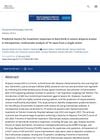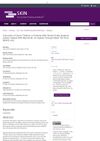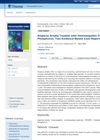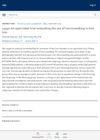August 2020 in “International Journal of Dermatology and Venereology” PRP is an effective and safe treatment for hair loss in women.

Current treatments for alopecia areata often fail to achieve and maintain significant hair regrowth.
138 citations,
March 2021 in “Journal of the American Academy of Dermatology” Ritlecitinib and brepocitinib effectively regrow hair in alopecia areata patients.
 3 citations,
September 2021 in “Journal of Investigative Dermatology”
3 citations,
September 2021 in “Journal of Investigative Dermatology” Baricitinib was more effective than a placebo in regrowing hair in adults with alopecia areata after 36 weeks.
 January 2025 in “The Journal of Dermatology”
January 2025 in “The Journal of Dermatology” Certain patient traits can predict better hair regrowth with baricitinib in severe alopecia areata.

Reducing the dose of Baricitinib to 2mg still helped over half of the patients with severe scalp alopecia maintain their hair regrowth after two years.
 67 citations,
January 2013 in “Indian Journal of Dermatology, Venereology and Leprology”
67 citations,
January 2013 in “Indian Journal of Dermatology, Venereology and Leprology” The document concludes that alopecia areata is an autoimmune disease without a definitive cure, but treatments like corticosteroids are commonly used.
5 citations,
April 2019 in “Journal of Nepal Health Research Council” People with Alopecia areata often have lower vitamin D levels, which may be linked to the severity of their condition.
 September 2023 in “Journal of The American Academy of Dermatology”
September 2023 in “Journal of The American Academy of Dermatology” Reducing the dose of Baricitinib to 2mg led to a loss of hair regrowth benefits in nearly half of the patients by Week-104.
 March 2024 in “Homœopathic Links”
March 2024 in “Homœopathic Links” Phosphorus homeopathy treatment led to complete hair regrowth in two Alopecia Areata patients.
 10 citations,
September 2014 in “European Journal of Dermatology”
10 citations,
September 2014 in “European Journal of Dermatology” A woman's hair loss worsened after starting hepatitis C treatment due to immune changes in her hair follicles.
 June 2017 in “Journal of the American Academy of Dermatology”
June 2017 in “Journal of the American Academy of Dermatology” Tofacitinib is effective and safe for treating severe alopecia areata and related conditions.
 139 citations,
November 2016 in “Journal of the American Academy of Dermatology”
139 citations,
November 2016 in “Journal of the American Academy of Dermatology” Tofacitinib helped regrow hair in most adolescents with alopecia areata, but more research is needed.
 April 2022 in “Research Square (Research Square)”
April 2022 in “Research Square (Research Square)” The combination of laser and topical steroids is more effective for treating alopecia areata than topical steroids alone.
28 citations,
April 2017 in “Journal of cosmetic dermatology” Low vitamin D can worsen pediatric alopecia areata.
 130 citations,
February 2018 in “Journal of Investigative Dermatology”
130 citations,
February 2018 in “Journal of Investigative Dermatology” Tofacitinib may help treat severe hair loss, but more research is needed.
 48 citations,
November 2017 in “Journal of the American Academy of Dermatology”
48 citations,
November 2017 in “Journal of the American Academy of Dermatology” Tofacitinib 2% ointment helped hair regrow in 3 out of 10 patients with alopecia areata, but caused side effects like scalp irritation and raised cholesterol in some.
 222 citations,
September 2016 in “JCI insight”
222 citations,
September 2016 in “JCI insight” Tofacitinib is safe and effective for severe alopecia areata, but hair loss may return 2 months after stopping treatment.
 April 2019 in “The journal of investigative dermatology/Journal of investigative dermatology”
April 2019 in “The journal of investigative dermatology/Journal of investigative dermatology” Machine learning can predict how well patients with alopecia areata will respond to certain treatments.
April 2017 in “Leukemia research” Tofacitinib helped most teenagers in the study regrow hair with mild side effects.
 6 citations,
February 2021 in “Advances in Clinical and Experimental Medicine”
6 citations,
February 2021 in “Advances in Clinical and Experimental Medicine” Wharton's jelly-derived stem cells were safely used to treat four alopecia patients, resulting in hair regrowth in all of them.
 4 citations,
January 2024 in “JEADV. Journal of the European Academy of Dermatology and Venereology/Journal of the European Academy of Dermatology and Venereology”
4 citations,
January 2024 in “JEADV. Journal of the European Academy of Dermatology and Venereology/Journal of the European Academy of Dermatology and Venereology” Baricitinib and ritlecitinib are recommended for severe alopecia areata, with other treatments available off-label.
 April 2024 in “Frontiers in pharmacology”
April 2024 in “Frontiers in pharmacology” Brepocitinib 30mg is most effective for moderate-to-severe alopecia areata, but ritlecitinib 50mg may offer a better balance of safety and effectiveness.
 May 2024 in “Journal of cosmetic dermatology”
May 2024 in “Journal of cosmetic dermatology” Tofacitinib is an effective and safe treatment for alopecia areata.
 February 2011 in “Annales de dermatologie et de vénéréologie”
February 2011 in “Annales de dermatologie et de vénéréologie” Tofacitinib shows promise for treating severe alopecia areata with good safety and effectiveness.
 September 2024 in “Journal of the American Academy of Dermatology”
September 2024 in “Journal of the American Academy of Dermatology” Microneedling mildly regrows hair in androgenetic alopecia but not in other types.

Liquid nitrogen cryotherapy is an effective treatment for alopecia areata.
 2 citations,
January 2023 in “Dermatology Practical & Conceptual”
2 citations,
January 2023 in “Dermatology Practical & Conceptual” AB+ blood group is more common in alopecia areata patients.
 12 citations,
January 2016 in “Journal of Clinical and Investigative Dermatology”
12 citations,
January 2016 in “Journal of Clinical and Investigative Dermatology” Low vitamin D levels are common in people with Alopecia Areata.
 3 citations,
September 2022 in “Archives of dermatological research”
3 citations,
September 2022 in “Archives of dermatological research” The fractional carbon dioxide laser is a safe and effective treatment for alopecia areata and works better than betamethasone valerate cream alone.
























